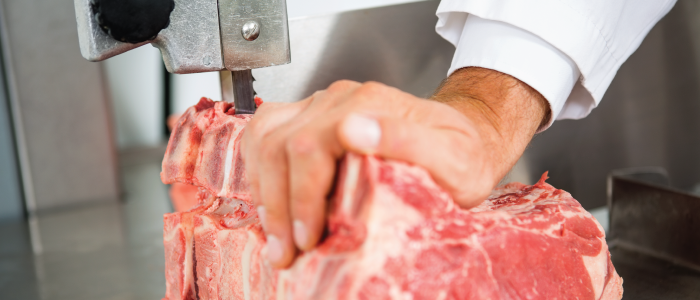Quick guide to buying the best butcher’s bandsaws
For centuries, butchers have always used their trusty butcher’s knives to prepare meat for cooking. Today though, the invention of the butcher’s bandsaws enables us to save countless hours and considerable effort when processing meat. If you’ve already started to shop for butcher’s bandsaws online, you’ll know that there’s no shortage of options available to you. But how do you tell the good ones from the bad? This week at Butcher’s Equipment Warehouse, we’re taking you through a quick overview of what exactly makes the best butcher’s bandsaws.
The quality of the bandsaw’s teeth
If you’ve experimented a bit in your time, there’s a chance you may have tried to use a regular hand hacksaw to try and cut meat. If so, you can attest to the kind of results you get! For those of you who haven’t: unless you’re very skilled and you’ve got some top-quality equipment like our very own butcher’s handsaws, you’re generally better off saving yourself the effort with a butcher’s bandsaw instead.
With many lower-quality handsaws – especially those not specifically designed to cut meat – the teeth are very fine, and angled to cut on both the forward and backward strokes. This means that on the return stroke, they’re often picking up fat, sinew and fibres from the meat. This clogs and dulls the blade, so you’ve got to use more elbow grease to successfully complete the cut.
Meanwhile, the teeth of butcher bandsaws like our Madock Meat Bandsaw are rougher, and angled much more sharply. This makes them much more capable of slicing evenly and efficiently, with the blade staying razor sharp. In fact, speaking of which…
The tension of the blade
The blade of any bandsaw – butcher’s or otherwise – has to be stretched tight in order to cut efficiently. Many of our butcher’s bandsaws here at Butcher’s Equipment Warehouse use a blade tensioner to maintain this tension. Making straight cuts also increases the “flexlife” (operational life) of the blade, reducing the cost per cut. Blade tensioners can be automatic or manual, such as the one on this SAP meat bandsaw. They’re not necessarily essential, but they offer tangible short and long term benefits, so we’d go as far as to say they’re certainly a feature of the best butcher’s bandsaws!
A powerful motor
As any experienced butcher knows, a butcher’s bandsaw without sufficient torque is next to useless for cutting meat. That’s why all the best butcher’s bandsaws have appropriately powerful motors in order to handle the strain. Now, we won’t go into the exact specifications of what makes a powerful motor. This is because the definitions can vary depending on how often the bandsaw is used, and its surrounding environment. A private butcher’s shop with a few members of staff, for example, might not have the same heavy-duty demand as a larger, commercial establishment. However, care should be taken before purchase to make sure that the motor is of sufficient power for your purposes, and that it’s not flimsy or prone to fail.
Of course, for the more commercial environments, few butcher’s bandsaws come fitted with a motor that outstrips the power of this Maica meat bandsaw. It makes the Maica an absolute powerhouse of a machine.
A smooth surface that’s easy to clean
This characteristic is more important than perhaps many people give it credit for. An easy-to-clean surface is more pleasant and convenient for employees, but in many cases it’s also safer, too. Many of the best meat bandsaws have detachable parts, such as the blade, which reduces the risk of accidental injury when cleaning the machine. Our own BEW Mincer 2000 is a bandsaw with just this sort of capability, so worth considering if you’re just starting out or if you have more inexperienced members of staff.
You can probably tell throughout this post that durability is a key concern. Having said that, you may well have your own ideas on what makes the best butcher’s bandsaws, so don’t hesitate to check out our range for yourself! If you have any questions, you can always give us a call on 01254 427 761.




